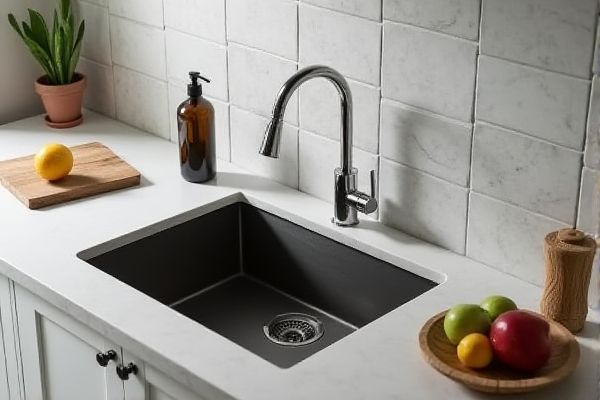
Undermount sinks create a seamless look by being installed beneath the countertop, making cleanup easier as debris can be wiped directly into the sink, while top mount sinks sit on top of the counter, offering easier installation and typically lower cost. Discover which sink type best fits Your kitchen needs and design preferences by reading the rest of the article.
Table of Comparison
| Feature | Undermount Sink | Top Mount Sink |
|---|---|---|
| Installation | Mounted below the countertop | Mounted on top of the countertop |
| Countertop Compatibility | Works best with solid surface countertops (granite, quartz) | Compatible with most countertop materials |
| Cleaning | Easy to clean with seamless edge | More cleaning needed around raised rim |
| Appearance | Modern, sleek, and seamless look | Traditional, visible rim design |
| Cost | Usually higher installation cost | Lower installation cost |
| Durability | Vulnerable to leaks if not sealed properly | More durable seal due to rim placement |
| Repair & Replacement | More complex and costly | Easy and affordable |
| Popular Uses | Luxury kitchens and commercial settings | Standard residential kitchens |
Introduction to Sink Mounting Styles
Undermount sinks are installed beneath the countertop, creating a seamless look and making countertop cleaning easier by allowing debris to be wiped directly into the sink. Top mount sinks, also known as drop-in sinks, sit above the countertop with a visible rim, offering simpler installation and compatibility with a wide range of countertop materials. Both mounting styles impact kitchen aesthetics, maintenance, and choice of countertop surfaces, influencing overall design functionality.
What is an Undermount Sink?
An undermount sink is installed beneath the countertop, creating a seamless surface ideal for easy countertop cleanup and a sleek modern look. Commonly used with solid surface materials like granite or quartz, it provides better countertop space utilization and prevents water from pooling around the sink edges. This type of sink requires precise countertop fabrication for proper installation and drainage.
What is a Top Mount Sink?
A top mount sink, also known as a drop-in sink, features a rim that rests on the countertop surface, making installation straightforward and ideal for DIY projects. This type of sink offers easy access for replacement and repairs due to its exposed edges and simpler mounting method. Top mount sinks are commonly made from stainless steel, porcelain, or composite materials, combining durability with a wide range of designs suitable for various kitchen styles.
Aesthetic Differences: Undermount vs Top Mount
Undermount sinks offer a sleek, seamless look by being installed beneath the countertop, highlighting clean lines and making countertops appear larger. Top mount sinks, also known as drop-in sinks, provide a visible rim that sits on the countertop surface, which can add a traditional or decorative edge depending on the material and design. Your choice between undermount and top mount sinks directly influences the kitchen's overall aesthetic, balancing modern minimalism against classic or functional styles.
Installation Process Comparison
Undermount sinks require precise countertop fabrication and professional installation to secure the sink beneath the counter surface, offering a seamless look but higher labor costs. Top mount sinks, also known as drop-in sinks, are easier to install as they simply drop into a pre-cut hole on the countertop, making them a more DIY-friendly option. Your choice between undermount and top mount sinks should consider the complexity of installation and the desired countertop aesthetics.
Cleaning and Maintenance Considerations
Undermount sinks offer easier cleaning since their seamless edge allows you to wipe crumbs and spills directly into the sink without debris getting trapped, reducing bacterial buildup. Top mount sinks have a rim that can collect grime and require more frequent scrubbing around the edges to maintain hygiene. Your choice impacts daily maintenance; an undermount sink provides a cleaner countertop surface, while a top mount sink may demand more attention to detail during cleaning routines.
Durability and Longevity
Undermount sinks, installed beneath the countertop, offer superior durability due to reduced exposure to countertop edges, minimizing chipping and wear over time. Top mount sinks, resting on the countertop surface, may be more prone to damage from frequent impact and water seepage around the rim, potentially shortening their lifespan. Choosing an undermount sink can enhance your kitchen's longevity by providing a stronger, more resilient integration with the countertop material.
Cost Differences and Budget Implications
Undermount sinks typically cost more due to their complex installation and need for precise countertop fabrication, while top mount sinks offer a more budget-friendly option with easier, less expensive installation. Choosing between undermount and top mount sinks impacts Your overall kitchen renovation budget, as undermount designs often require professional labor and custom countertops, increasing total costs. Homeowners seeking cost efficiency often prefer top mount sinks to balance quality and budget constraints without compromising functionality.
Best Applications for Each Sink Type
Undermount sinks are ideal for kitchens with solid surface countertops like granite or quartz, offering a seamless look and easier countertop cleaning by allowing you to wipe debris directly into the sink. Top mount sinks suit laminate or tiled countertops, providing easier installation and replacement, as they rest on the counter with a visible rim that supports the sink's weight. Your choice depends on countertop material and maintenance preferences, with undermount sinks favored for a modern, integrated appearance and top mount sinks for budget-friendly, versatile setups.
How to Choose: Undermount or Top Mount Sink?
Choosing between an undermount and top mount sink depends on your kitchen design, maintenance preferences, and countertop material. Undermount sinks provide a sleek, seamless look and are easier to clean since debris can be wiped directly into the sink, making them ideal for solid surface, granite, or quartz countertops. Your decision should balance aesthetic appeal, ease of cleaning, and compatibility with your countertop to optimize both function and style in your kitchen.
 homyna.com
homyna.com